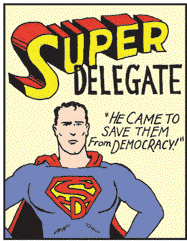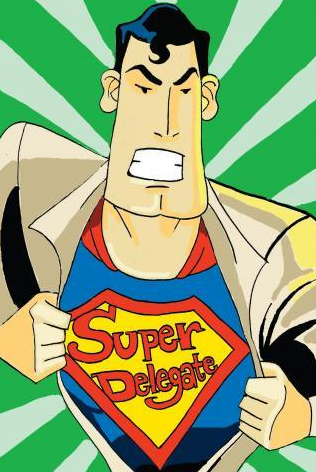 aNewDomain — It’s over. It’s over before it’s begun.
aNewDomain — It’s over. It’s over before it’s begun.
Hillary Clinton has already won the Democratic nomination for president.
Before a single Iowa caucusgoer or New Hampshire voter or any other American voter has had a chance to weigh in, Hillary has it all wrapped up.
The die is cast.
The game is fixed.
It doesn’t matter how many Democrats “feel the Bern” — despite the tens of thousands of young people filling sports arenas all over the country because they’re excited about the socialist senator from Vermont’s message that it’s time for a “political revolution” that prioritizes working people and takes back the wealth getting sucked out of the economy by the “billionaire class.”

Blame it on the superdelegates. “Superdelegates are convention delegates who can support any candidate, no matter whom voters choose in the primaries and caucuses. They are members of Congress and other elected officials, party leaders and members of the Democratic National Committee,” explains the Associated Press.
“Hillary Rodham Clinton has locked up public support from half of the Democratic insiders who will cast ballots at the party’s national convention, giving her a big head start in securing the nomination more than two months before primary voters start going to the polls.” The 712 superdelegates make up about 30 percent of the 2,382 delegates needed to clinch the Democratic nomination.
Of the 80 percent of superdelegates willing to fess up their affiliation, 359 support Clinton. Eight plan to vote for Bernie Sanders and two for Martin O’Malley, the former Maryland governor who made a splash at Saturday’s Democratic debate. Exactly 210 of them say they’re uncommitted.”
Says the AP, “Clinton’s margin over Vermont Sen. Bernie Sanders and former Maryland Gov. Martin O’Malley is especially notable because most of the people known as superdelegates don’t usually back candidates so early in the race.”
Nate Silver’s 538 political analysis blog currently gives Sanders a 13 percent chance of taking the Democratic nomination.
Could Sanders still win? That depends on how much you’re willing to bet on 13 percent.”
Lots of things have happened to you with far longer odds: Being the one car in a cluster of automobiles driving the same velocity to get singled out by a cop for a speeding ticket probably beat those odds by a lot.
On the other hand, would you invest $1,000 in a stock with a 13 percent chance of going up and an 87 percent chance of dropping in value? Probably not.
Given the dutiful, less than thrilling support among Hillary’s Democrats versus the energized progressives backing Bernie, it might be time to rethink the superdelegate system, or abolish it entirely in favor of a more small-d democratic one — you know, in which every vote counts equally. Despite conventional wisdom that says staid moderates stand a better chance in the general election against the Republicans, opting for the “safe” choice often leads to electoral disaster. In 2004 John Kerry didn’t prove a better candidate than Howard Dean.
The Sanders vs. Clinton race recalls 1980, when Ted Kennedy challenged incumbent Jimmy Carter, Kennedy being defeated by arcane delegate rule changes jammed through by DNC bosses.”
Liberals disgruntled by Carter’s centrist policies sat on their hands in the fall, contributing to the party’s defeat to Ronald Reagan.
True, Bernie Sanders might win. Hillary could fall ill. She could find herself embroiled in a scandal; she is a Clinton, after all. But why should Sanders, or any other party “outsider,” begin his fight for the nomination 359 delegates in the hole?
Democrats like to say they’re the party of the people.
Maybe they should let the people choose their president. Crazy, I know.
For aNewDomain, I’m Ted Rall.
Cover image: SatireV.org, All Rights Reserved; image one: Brainrow.com, All Rights Reserved.













